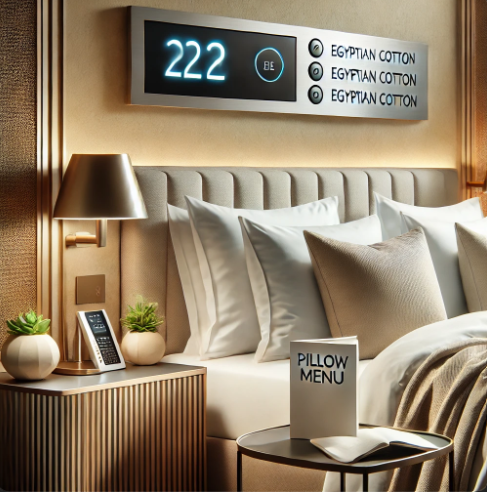The term HORECA, encompassing Hotels, Restaurants, and Cafés, represents a vital segment of the hospitality industry that caters to customer experiences centered around comfort, quality, and service. Understanding how HORECA connects with hotel amenities reveals the industry’s commitment to creating a holistic and welcoming environment for guests. This relationship is pivotal to guest satisfaction, competitive advantage, and the seamless integration of services. How HORECA Is Related to Hotel Amenities.

Understanding HORECA and Its Scope
HORECA refers to a network of establishments that offer lodging, food, and drink, and it serves as a unified representation of the hospitality ecosystem. Here’s how each component ties in:
- Hotels: These establishments offer accommodations and a range of guest services, including dining, leisure, and business amenities.
- Restaurants: Often part of hotels or independent entities, these places enhance culinary experiences for guests.
- Cafés: Less formal than restaurants, cafés provide a relaxed atmosphere with lighter meal options, complementing hotel amenities and guest needs.
The interplay between HORECA and hotel amenities isn’t just about the provision of services but about crafting an experience that seamlessly blends relaxation, dining, and comfort.
The Role of Hotel Amenities in Enhancing HORECA Services
- Room Comfort and Luxury: Hotel rooms serve as more than just places to rest; they are comprehensive spaces tailored to comfort and relaxation. Key amenities include high-quality linens, ergonomic furnishings, and entertainment options like smart TVs and Wi-Fi. Integrating these comforts aligns with HORECA’s goal of delivering a guest-centric experience. Premium hotels often incorporate unique features like pillow menus or in-room wellness kits to distinguish themselves.
- Food and Beverage Excellence: A cornerstone of the HORECA sector is its emphasis on food and beverage services. The dining experience in hotels goes beyond just breakfast; it extends to specialized restaurants, room service, and buffet offerings. This variety ensures that guests can enjoy diverse cuisines and fine dining without needing to step outside the premises. Moreover, on-site cafés contribute by offering quick snacks and specialty drinks, enriching the overall experience.
- Leisure and Wellness Facilities: For a truly comprehensive stay, amenities like spas, pools, and fitness centers are indispensable. HORECA thrives on these elements as they attract a wide range of guests, from business travelers to vacationers. Wellness centers that offer massages, saunas, and yoga classes can transform a stay from mundane to memorable, fulfilling the HORECA promise of an all-in-one experience.
- Business and Conference Facilities: Hotels that cater to business professionals often feature state-of-the-art conference rooms, coworking spaces, and high-speed internet. These amenities are essential for guests who blend work and leisure, aligning with the HORECA sector’s expansion into the ‘bleisure’ (business + leisure) trend. Providing these services ensures that hotels remain relevant and appealing to a diverse clientele.
- Sustainability Initiatives: Modern travelers are increasingly eco-conscious, and sustainable amenities help align HORECA services with guest expectations. Features such as energy-efficient lighting, waste recycling, and locally sourced food options in restaurants speak to this growing demand. Integrating sustainability into hotel amenities not only boosts appeal but demonstrates a commitment to responsible hospitality.

The Competitive Edge of Comprehensive Hotel Amenities
Hotels that successfully integrate extensive amenities into their offerings create a competitive edge within the HORECA market. This advantage can be broken down into several key benefits:
- Enhanced Guest Retention: A stay that caters to both basic needs and indulgences leaves a lasting impression, fostering guest loyalty.
- Higher Revenue Opportunities: Additional amenities such as spas, upscale dining options, and special room packages can significantly boost revenue.
- Increased Market Appeal: Hotels that provide comprehensive services attract a wider range of guests, from luxury travelers to budget-conscious visitors looking for specific amenities.
How Technology Amplifies HORECA and Hotel Amenities
Technological advancements are reshaping how hotels offer their amenities, enhancing the HORECA experience. Smart rooms, mobile check-ins, and automated concierge services exemplify how tech-driven amenities improve guest convenience and streamline operations. Such innovations align with HORECA’s focus on efficient service delivery, elevating the standard of guest experiences.
Case Study: The Integration of Technology
Consider a hotel that implements a guest app allowing visitors to control room temperature, request room service, or book spa treatments with a few taps. This approach not only caters to modern preferences but also strengthens HORECA’s image as a forward-thinking sector.
Challenges and Solutions in Merging HORECA and Hotel Amenities
While the union of HORECA and hotel amenities results in impressive service delivery, it comes with its challenges:
- Operational Costs: Maintaining top-tier amenities can be costly, demanding significant investment in staff, resources, and technology.
- Consistency in Service: Ensuring uniform quality across all facilities, whether a fine-dining restaurant or a simple café, can be complex.
Solutions: Hotels can manage these challenges by leveraging partnerships, focusing on training, and employing a flexible service model that scales according to guest demand.

FAQs
What does HORECA stand for? HORECA stands for Hotels, Restaurants, and Cafés, representing a key segment in the hospitality industry.
How do hotel amenities contribute to the HORECA experience? Hotel amenities such as luxurious rooms, dining options, and wellness centers enhance the guest experience, aligning with HORECA’s emphasis on comfort and service.
What are some essential amenities that align with HORECA services? Essential amenities include high-quality room furnishings, diverse dining options, spas, fitness centers, and conference facilities.
Why is sustainability important in HORECA and hotel amenities? Sustainability meets the growing demand for eco-conscious travel and enhances a hotel’s image as a responsible service provider.
How does technology affect HORECA-related amenities? Technology enhances convenience, streamlines operations, and modernizes the guest experience, aligning with HORECA’s goal of efficient and high-quality service.
